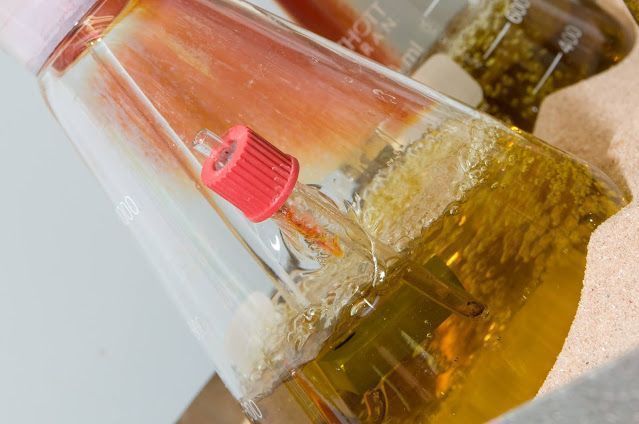
The pharmaceutical industry has distinct needs concerning corrosion prevention that require an integrated approach.
In the pharmaceutical field, new processes are developed with strict time constraints. Corrosion may have a direct impact on the quality of the end product. Since it concerns medicines, a well-founded follow-up of the quality control is of the utmost importance.
To ensure that their installations are corrosion-proof and perform under excellent conditions, the pharmaceutical industry performs several testing procedures. In this article you will discover an overview of best practices. That way, you can suit up against corrosion issues.
Corrosion testing: a preventive take on corrosion risk for each new production line
When a new process runs in existing reactors or when a new production line is built you typically want to know beforehand if there is a risk for corrosion under these new conditions. Corrosion testing offers a solution in that case.
Long term exposure test
Typically for the pharmaceutical industry, exposure tests are performed in which corrosion coupons (metal plates of the reactor material) are exposed to the worst case conditions of the new process. After the test the coupons are removed, cleaned and weight loss measurements are performed to determine the corrosion rate. Localized corrosion is investigated by means of microscopy and the pit depth is measured. There is a caveat with these tests.
In practice, batches are run and in between batches the material, typically a stainless steel type or Hastelloy type, has the chance to repassivate. By running a relatively simple long term exposure test in which the material is continuously exposed to the medium, you obtain a very worst case result since no chance for repassivation of the metal to air is allowed.
If after this test no corrosion is found, you may rest assured that no corrosion will be encountered after several batches. However, if corrosion is observed after such a long term exposure test, a second test with better simulation, incl. cleaning and repassivation steps, should be included.
For enamel-lined reactors testing is more straightforward: long term tests (measured out in weeks) provide the best information with regard to the resistance of the enamel to the new conditions. The enameled coupons are evaluated visually before and after exposure to detect any degradation.
Electrochemical tests for the pharmaceutical industry: when you require a quick result
Building a new line poses several challenges. Material selection is one of those challenges. With limited time available electrochemical tests can be performed and are in that case often preferred over the longer term exposure tests. When performing such tests care should be taken that the materials to be tested are brought into a condition (surface finish, passivation, …) that matches the real surface condition as closely as possible. If not possible, a conservative approach is needed.
Corrosion testing for base material and welds
Not only the base material can be tested. Due to differences in composition, residual stresses, microstructure, … weldings can be more sensitive to corrosion. Welded coupons can be tested to include this aspect in the study. As an example we have studied the use of different welding wires and their influence on corrosion of the weldings. A ranking of proposed methods with regard to susceptibility to corrosion was determined in the design stage of a new production line.
Corrosion tests at TÜV AUSTRIA Belgium: how to get started
Do you have a specific question with regard to corrosion tests? This is how we typically proceed:
- You briefly describe the conditions and materials you would like to test.
- We contact you in case we need more information or to discuss the exact conditions.
- We provide you with a quotation for the testing.
- You provide us agreed quantities of the medium (typically 1 L per material/medium combination).
- We provide the coupons and perform the tests.
- We deliver a report incl. results and interpretation.
- If needed the report can be discussed.
In summary, corrosion testing in the pharmaceutical field requires a one-of-a-kind approach. You can opt for a long-term or short-term option, depending on your specific case. Of course our experts are only a phone call away to advise you on what test setup suits you best. Either way, corrosion testing is the best way to arm yourself against unpleasant surprises due to corrosion.




